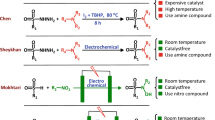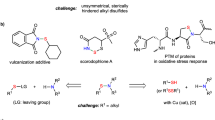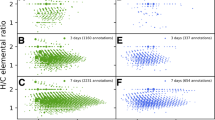Abstract
SULPHAMIC acid (aminosulphonic acid) decomposes nitrites quantitatively1 with evolution of nitrogen gas according to the equation  The reaction, which is very specific and strongly catalysed by hydrogen ions, may be used for the removal of interfering nitrites, for example, when testing for nitrates2, or in water analysis as part of the Winkler method for dissolved oxygen determinations, where nitrites will cause serious error unless removed. For this latter purpose, according to Cohen and Ruchhoft3, sulphamic acid possesses distinct advantages over sodium azide.
The reaction, which is very specific and strongly catalysed by hydrogen ions, may be used for the removal of interfering nitrites, for example, when testing for nitrates2, or in water analysis as part of the Winkler method for dissolved oxygen determinations, where nitrites will cause serious error unless removed. For this latter purpose, according to Cohen and Ruchhoft3, sulphamic acid possesses distinct advantages over sodium azide.
This is a preview of subscription content, access via your institution
Access options
Subscribe to this journal
Receive 51 print issues and online access
$199.00 per year
only $3.90 per issue
Buy this article
- Purchase on SpringerLink
- Instant access to full article PDF
Prices may be subject to local taxes which are calculated during checkout
Similar content being viewed by others
References
Yost, D. M., and Russel, jun., H., “Systematic Inorganic Chemistry” (Oxford University Press, 1946).
Feigl, F., “Qualitative Analyses by Spot Tests” (3rd (English) edit., Elsevier Pub. Co., 1947).
Cohen, S., and Ruchhoft, C. C., Indust. and Eng. Chem., Anal. Edit., 13, 622 (1941).
Author information
Authors and Affiliations
Rights and permissions
About this article
Cite this article
HORA, F., JONES, A. Sulphamic Acid as a Test for Nitrate-reducing Bacteria. Nature 166, 351 (1950). https://doi.org/10.1038/166351a0
Issue date:
DOI: https://doi.org/10.1038/166351a0



